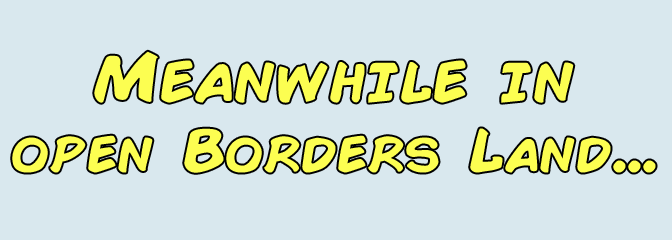Recently my co-blogger Vipul has begun to write about visa policy in the United States: about how most visas cannot be renewed within the United and about automatic visa validation. Vipul’s posts reminded me about a plot line in PhD Comics, written by Jorge Cham, PhD.
A few years back Tajel, the strip’s social science graduate student and resident foreigner, discovers that her visa has expired. The story chronicles Tajel as she discovers that she might be an illegal alien, her journey to Mexico to renew her visa there and, as obligatory of any comic series dealing with graduate students, makes several jokes at the expense of higher education.
The series also gave birth to this lowly little explanation of the student visa system in the United States:
Despite the comedic nature of these comics, they do give us some idea on how we might wish to push forward when making our case for open borders. We must (and currently do) make our case towards intellectuals, but we must also make the case towards the average man on the street. Comics might be one avenue to explore.
The beauty of comics is their simplicity. Due to the history of comics in newspaper the profession has adopted the four-panel (or Yonkoma) standard. A comic had to be short as larger strips were difficult to fit it into the valuable space in a newspaper layout. The result has been that comic artists have had to master telling their story quickly. With the dawn of web comics artists have been able to experiment with panel designs, but even then the most popular comics use as few as possible panels as possible.
Am I implying that the average man on the street is incapable of comprehending ‘intellectual’ arguments? Not at all. The average man does however have different comparative advantages and resources than ‘intellectuals’. The average man on the street is juggling work and family life; the amount of time he can devote to leisurely pursuits is limited. We should not be surprised then if he prefers to browse the funny pages over picking up a book on the economics of immigration.
Comics themselves are often seen as ‘low’ culture, but I think this is unmerited. Comics can be, and have been, used to discuss serious issues. Alan Moore, a comic artist best known perhaps for his work on the Watchmen or V for Vendetta, has used his art to share his anti-authoritarian view on politics. Aaron McGruder, creator of the Boondocks strip, uses the media form to discuss current events from his uniquely leftist view. Little Orphan Annie, which modern audiences might better remember as the source material of the musical Annie, was created by Harold Gray to attack the New Deal and promote conservative politics.
Read More In This Series
This is an ongoing series on ideas on how the open borders movement should proceed next.
What should be next for the Open Borders movement? by Michelangelo Landgrave
Philosophers, Wonks, and Entrepreneurs by Vipul Naik
Why the Open Borders Movement Should (Mostly) Avoid Emulating the Gay Marriage Movement by Nathan Smith
You can read the rest of Tajel’s visa story at phdcomics.com. For the convenience of readers I’ve compiled the relevant comics below (the series had several mini-arcs in between).
Part #1 – Did you know your student visa is expired?
Part #2 – I’m harboring an illegal alien?
Part #3 – Apparently it’s the D/S on the I-20 that determines USCIS…
Part #4 – Give us your tired, your poor, your thoroughly confused…
Part #5 – I’ll go to Tijuana!
Part #6 – The F-1 Student Visa Process Explained
Part #7 – Your application triggered several red flags.
Part #8 – For security purposes we need a statement of exactly what your thesis is.
Part #9 – At least you picked me over the internet.
Part #10 – Professors: More Elusive Than Ninjas?
Part #11 – Ninjas vs Professors: A Comparative Analysis
Part #12 – I see him!
Part #13 – Professors exist as probability density functions.
Part #14 – Does this mean interactions are purely hypothetical?
Part #15 – I wonder what’s going on today?
Part #16 – Did someone not need me?
Part #17 – Free the burros!
All images copyright of their respective creators.





2 thoughts on “Immigration Comics”